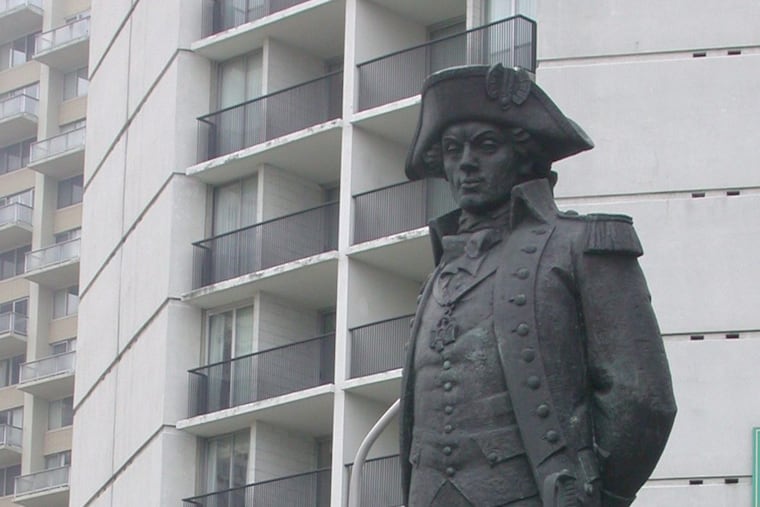Jefferson's missed opportunity to free his slaves
Kosciuszko, a hero of the American Revolution, had planned to leave the heavily indebted Jefferson his wartime pay as compensation for freeing his slaves.

On Oct. 17, 1817, one of the world's champions of universal freedom and social justice died in the Swiss village of Soleure. Tadeusz Kosciuszko, who was one of George Washington's most important military engineers in the Revolutionary War, was mourned around the world. For Poles today he is revered for his attempts to save Poland from occupying Russians, Austrians, and Prussians; for attempting to end serfdom; and as an architect of the Polish constitution of 1793, based on the Enlightenment principles that undergirded the U.S. Constitution.
Importantly, Kosciuszko had also hoped to trigger the end of slavery in the United States by persuading his friend Thomas Jefferson to free his slaves. Kosciuszko had planned to leave the heavily indebted Jefferson his wartime pay, finally conferred by Congress in 1797, as compensation for freeing his slaves. "What an all-conquering influence must have attended his illustrious example," if Jefferson had seized the moment, wrote abolitionist William Lloyd Garrison many years later.
In his cramped quarters at Third and Pine in Philadelphia in 1797-98, Kosciuszko communed frequently with Jefferson, then the vice president. They were soon so close that Jefferson was soon calling Kosciuszko "as pure a son of liberty as I have ever known, and of that liberty which is to go to all, and not to the few or the rich alone." When Kosciuszko penned his extraordinary will on April 20, 1798, he named Jefferson as both executor and beneficiary: "I authorize my friend Thomas Jefferson to employ the whole [of the estate] thereof in purchasing Negroes from among his own or any others and giving them liberty in my name." It was the Pole's last act on American soil, for shortly after he abruptly left, escaping what he believed was his imminent seizure as an agent of the French revolutionary government.
Part of what inspired Kosciuszko's gesture was a free black man who had stood at the Polish hero's side as his attendant for more than four years during the war. Born in Northampton, Mass., Agrippa Hull had joined Washington's Continental Army in 1777 and then served as Kosciuszko's orderly. It was Hull's intelligence, diligence, and dedication to inalienable rights that convinced Kosciuszko of the falsity of the argument that innate black inferiority made African enslavement part of Nature's unalterable design. Moreover, Kosciuszko grew to admire the courage of black soldiers in battle. As his bond with Hull grew, the Polish general became increasingly dismayed that white Americans were fighting for universal principles that they denied to half a million enslaved blacks.
When he returned to the United States 14 years after the war ended, Kosciuszko hoped he might chip away at the new nation's continued commitment to slavery — a cancer eating away at the bedrock principles on which the new republic was founded.
The day of reckoning came when Kosciuszko died at the foot of the Alps in 1817. In his last letter to Jefferson, a month before his death, Kosciuszko reminded his friend of the solemn oath they had made in Philadelphia in 1798. Of his American assets, he wrote: "After my death you know their fixed destination."
Months after Kosciuszko's death was lamented across America, Jefferson rode his horse down the mountain at Monticello to the Albemarle County Courthouse in Charlottesville. He dismounted "stately and erect," as the court deputy clerk wrote, "pulled out of his pocket … the will of his friend, General Tadeusz Kosciuszko," and testified that he was unwilling to serve either as executor or beneficiary of the will.
In reneging on the pledge he made 19 years before, Jefferson surrendered the opportunity to free his own children, born of Sally Hemings, along with dozens of other slaves who toiled alongside her. All could have gone free while the author of the Declaration of Independence accepted full compensation for the loss of their labor.
Thus transpired a tragic betrayal of freedom in the new nation.
Gary B. Nash, a professor history at the University of California, Los Angeles, will discuss his book "Friends of Liberty: Thomas Jefferson, Tadeusz Kosciuszko and Agrippa Hull" at 5:30 p.m. Sept. 23 at the Museum of the American Revolution. For tickets, visit www.amrevmuseum.org.